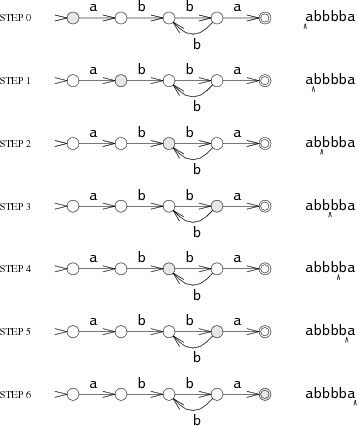Regular Expression

Narrowest Chomsky_hierarchy formal language class:
- Can be (relatively) easily parsed
- Can describe almost any possible pattern, not bound to context and having no internal parts dependence (e. g. «a if precedes by b» or «integer number, than that number of characters» can not be described)
- Laconic
Warning: To write a regexp is far easier than to read other’s regexp.
Examples of regular expressions can be found here. For experiments with regular expressions, the regex101 site can be used.
Regexp Tools
-
Find. grep: filtering strings that contain regexp:
$ cal | grep 18 16 17 18 19 20 21 22 $ cal | grep '9.*4' 9 10 11 12 13 14 15- (!) try all examples above via
grep(happily it colors all substring matches) vim(command enter command-line mode)/regexp: search forward?regexp: search backward
less— same- …
- (!) try all examples above via
-
Search and replace. sed: stream editor.
- Search and replace:
s/regexp/replacement- Replace once
$ cal | sed 's/[12][23]/@@/' March 2020 Su Mo Tu We Th Fr Sa 1 2 3 4 5 6 7 8 9 10 11 @@ 13 14 15 16 17 18 19 20 21 @@ 23 24 25 26 27 28 29 30 31 - Replace all (__g__lobally)
$ cal | sed 's/[12][23]/@@/g' March 2020 Su Mo Tu We Th Fr Sa 1 2 3 4 5 6 7 8 9 10 11 @@ @@ 14 15 16 17 18 19 20 21 @@ @@ 24 25 26 27 28 29 30 31
- Replace once
- Group recall: every substring matched regexp grouped by “
\(”/”\)" can be inserted into replacement string by referencing to corresponded number ("\1", "\2`” etc):$ cal | sed 's/2\([0-6]\)/=\1/g' March =0=0 Su Mo Tu We Th Fr Sa 1 2 3 4 5 6 7 8 9 10 11 12 13 14 15 16 17 18 19 =0 =1 =2 =3 =4 =5 =6 27 28 29 30 31 $ echo '15 16 17 18 19 20 21' | sed 's/\(15\)\(.*\)\(20\)/\3\2\1/' 20 16 17 18 19 15 21 $ echo '==15 16 17 18 19 20 21==' | sed 's/\([0-9][0-9]*\).*\([0-9]\)/\1\2/' ==151== $ echo '==15 16 17 18 19 20 21==' | sed 's/\([0-9]*\).*\([0-9]\)/\1\2/' 1==- (!) check [[#complex]] examples with
sed - Groups are numbered by the opening parenthesis order:
$ echo 'aaabbbccc' | sed 's/\(a*\(b*\)\)/\2-\1=/' bbb-aaabbb=ccc $ echo '15 16 17 18 19 20 21' | sed 's/\(1.*7.*\(8.*2\)\)/\2-\1=/' 8 19 20 2-15 16 17 18 19 20 2=1
- (!) check [[#complex]] examples with
- Search and replace:
-
Text editor.
vim: same assed, but plus:- ”
:s/regexp/replacement/” — replace once in current line - ”
:s/regexp/replacement/g” — replace all (globally) in current line - ”
:%s/regexp/replacement/g” — replace all in the while file - ”
:10,30s/regexp/replacement/g” — replace all in 10, 11, …, 30 line - ”
:/BEGIN/,/END/s/regexp/replacement/g” — replace all in lines started from line containsBEGINto the line containsEND - ”
:/main(/,/^}/s/'\([^']*\)'/"\1"/g” — replace all «'...'» strings (wich are not in C :) ) to «"..."» (which are) in functionmain() - ”
:/main(/,/^}/s/'\([^']*\)'/"\1"/gc” — do the same with confirmation of each replacement
- ”
Regexp in C language
The C language provides library functions to deal with regular expressions declared in the <regex.h> header.
See details here. Main functions:
regcomp- compiles a regular expression;regexec- performs a search for the specified regular expression in a string;regfree- frees the compiled regular expression.
The example below takes two command-line arguments
(regular expression arv[1] and argv[2] text) and checks whether they match.
Command:
tatarnikov@akos:~$ ./regex2 "^H.*s$" "Higher School of Economics"
'Higher School of Economics' matches '^H.*s$'
tatarnikov@akos:~$ ./regex2 "^H.*s$" "Higher School of Economics_"
'Higher School of Economics_' mismatches '^H.*s$'
tatarnikov@akos:~$
Code:
#include <stdint.h>
#include <stdio.h>
#include <stdlib.h>
#include <regex.h>
int match(const char *string, char *pattern) {
int status;
regex_t re;
if (regcomp(&re, pattern, REG_EXTENDED|REG_NOSUB) != 0) {
return 0;
}
status = regexec(&re, string, (size_t) 0, NULL, 0);
regfree(&re);
if (status != 0) {
return 0;
}
return 1;
}
int main(int argc, char *argv[]) {
char* regex = argv[1];
char* name = argv[2];
if (match(name, regex)) {
printf("'%s' matches '%s'\n", name, regex);
} else {
printf("'%s' mismatches '%s'\n", name, regex);
}
return 0;
}
The example below finds all matches of the specified regular expression in the specified text:
#include <stdint.h>
#include <stdio.h>
#include <stdlib.h>
#include <regex.h>
#define ARRAY_SIZE(arr) (sizeof((arr)) / sizeof((arr)[0]))
static const char *const str =
"1) John Driverhacker;\n2) John Doe;\n3) John Foo;\n";
static const char *const re = "John.*o";
int main(void) {
static const char *s = str;
regex_t regex;
regmatch_t pmatch[1];
regoff_t off, len;
if (regcomp(®ex, re, REG_NEWLINE))
exit(EXIT_FAILURE);
printf("String = \"%s\"\n", str);
printf("Matches:\n");
for (int i = 0; ; i++) {
if (regexec(®ex, s, ARRAY_SIZE(pmatch), pmatch, 0))
break;
off = pmatch[0].rm_so + (s - str);
len = pmatch[0].rm_eo - pmatch[0].rm_so;
printf("#%d:\n", i);
printf("offset = %jd; length = %jd\n", (intmax_t) off, (intmax_t) len);
printf("substring = \"%.*s\"\n", len, s + pmatch[0].rm_so);
s += pmatch[0].rm_eo;
}
exit(EXIT_SUCCESS);
}